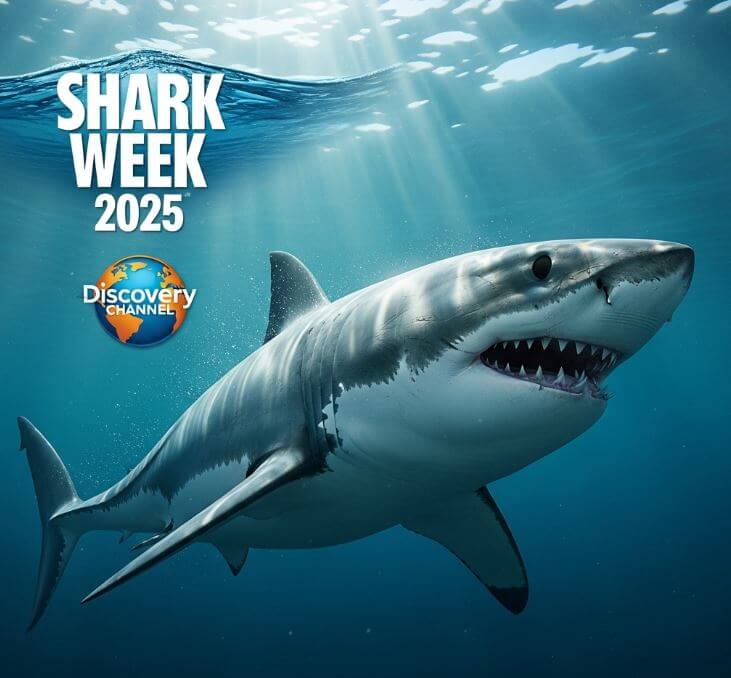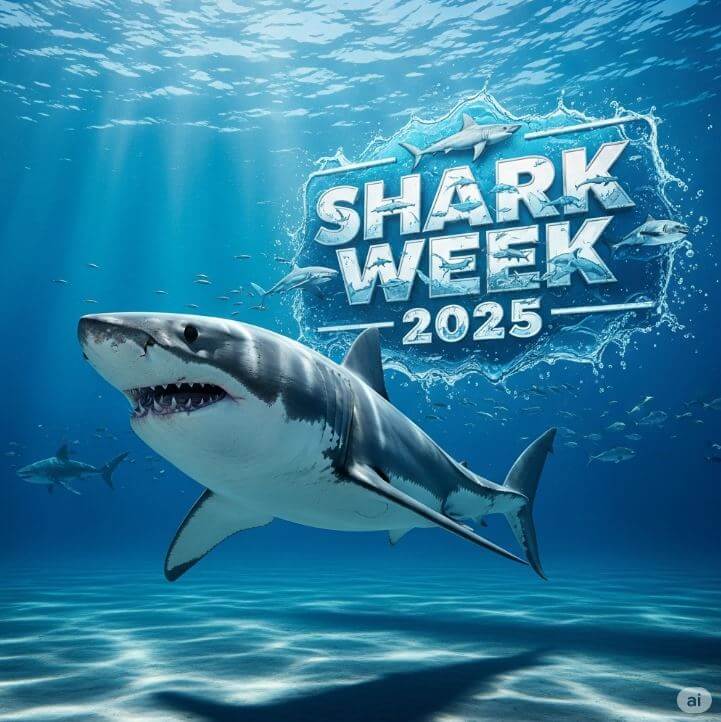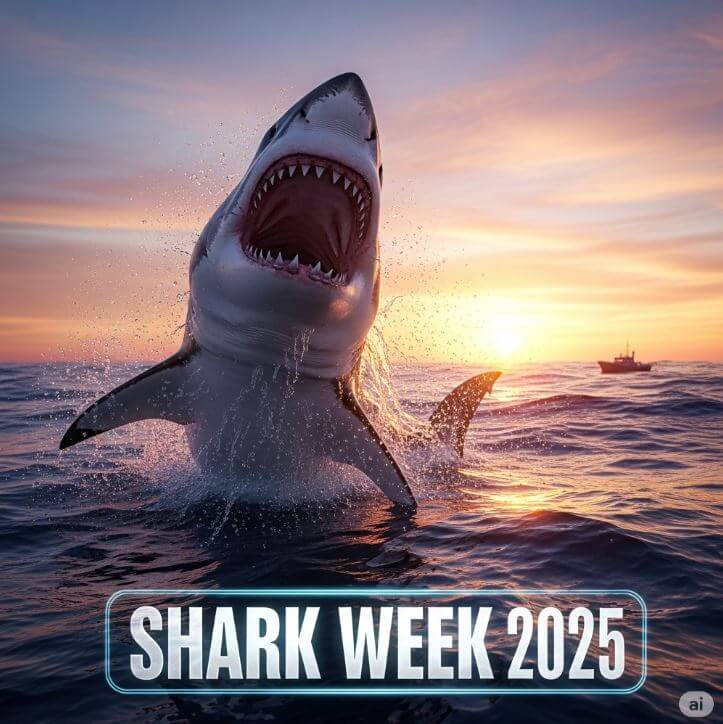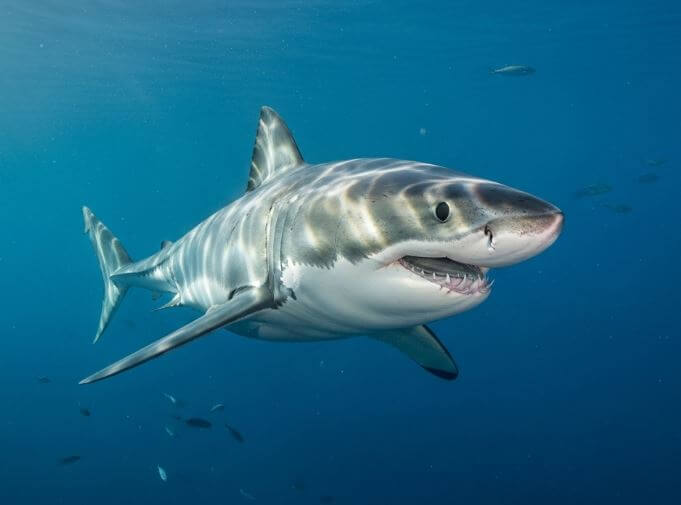Contents
- 1 I. Introduction: The Enduring Phenomenon of Shark Week
- 2 II. Shark Week 2025: Dates, Hosts, and How to Watch
- 3 III. Dive Deep into the 2025 Programming Lineup
- 4 IV. Beyond the Thrills: Shark Week’s Evolving Purpose and Impact
- 5 V. Conservation and Science: A Closer Look at Shark Week’s Educational Role
- 6 VI. Experiencing Shark Week 2025: Digital and Beyond
- 7 VII. Conclusion: The Future of Shark Week
I. Introduction: The Enduring Phenomenon of Shark Week

Shark Week, an annual week-long programming block on the Discovery Channel, has cemented its place as a quintessential summer event. It first premiered on July 17, 1988, with “Caged in Fear” as its inaugural broadcast, quickly capturing public attention and almost doubling Discovery Channel’s primetime average ratings in its debut year. From its inception, the event was designed with a dual objective: to showcase shark-themed programming while simultaneously fostering conservation efforts and dispelling common misconceptions about these often-feared marine creatures. Over its remarkable 37-year history, Shark Week has evolved into the longest-running cable television programming event, extending its reach globally through Warner Bros. Discovery’s broadcasts in over 72 countries. This enduring presence underscores its significant cultural footprint, influencing media narratives, marketing strategies, and public discourse surrounding sharks.
The evolution of Shark Week reflects a dynamic interplay between its foundational educational mission and the demands of popular entertainment. While it began with a clear scientific and conservation mandate, the programming gradually incorporated more entertainment-oriented and, at times, fictionalized content, a shift particularly noticeable by the 2010s. This approach, often termed “docufiction,” proved highly effective in boosting viewership and popularity, despite drawing considerable criticism from the scientific community. A prime illustration of this strategy’s impact was “Megalodon: The Monster Shark Lives,” a fictitious mockumentary that, despite generating significant controversy and backlash from science professionals and advocates, became one of the most-watched programs in Shark Week history. This outcome highlights a persistent dynamic where sensationalism, even if it deviates from factual accuracy, can drive immense audience engagement.
The enduring appeal of Shark Week, despite its occasional forays into dramatic or fictionalized narratives, lies in its capacity to simultaneously tap into primal human fascination and fear of apex predators while maintaining a connection to a broader educational purpose. The controversy generated by programs like “Megalodon” did not deter viewers; rather, it often amplified public discussion and engagement. This suggests that for a considerable segment of the audience, the thrill and spectacle of the programming often take precedence over strict scientific precision, creating a unique situation where entertainment becomes a powerful vehicle for raising awareness, even if that awareness is sometimes skewed. This phenomenon underscores a significant challenge in science communication: how to render complex or less dramatic scientific research, such as detailed studies on shark life history, reproduction, or practical conservation measures, as compelling as more sensationalized narratives. Shark Week’s continued success demonstrates that while entertainment can be a potent tool for engagement, it also carries the inherent risk of misinforming or reinforcing misconceptions if not carefully balanced with factual integrity.
Shark Week 2025, marking its 37th anniversary, continues this tradition, scheduled to run from July 20 to July 26. This year’s event promises a fresh lineup of documentaries and specials that aim to blend thrilling content with educational insights, continuing to engage millions of viewers who anticipate this annual summer programming event.
II. Shark Week 2025: Dates, Hosts, and How to Watch

Shark Week 2025 is set to captivate audiences from Sunday, July 20, through Saturday, July 26. Programming will commence nightly, typically kicking off at 8 p.m. ET/PT on the Discovery Channel.
In terms of celebrity involvement, a notable shift is apparent for Shark Week 2025. While previous years saw major personalities like Dwayne “The Rock” Johnson, Jason Momoa, and John Cena take on overarching hosting duties, there is no single official host announced for Shark Week 2025. Instead, the focus appears to be on integrating notable personalities within specific, high-profile programs. For instance, Emmy Award-winning TV personality Tom Bergeron, widely recognized for his work on “Dancing with the Stars,” will host the new special “Dancing with Sharks”. This approach suggests a more distributed model of celebrity engagement, emphasizing the content itself rather than a singular figurehead for the entire week. This represents an evolving marketing strategy. Instead of relying on one celebrity to carry the entire week, Discovery appears to be concentrating its star power on a few key, high-concept programs. This could be a deliberate choice to allow the content to drive interest, or perhaps a strategy to diversify celebrity appeal across different shows rather than centralizing it, reflecting a maturation of the Shark Week brand where its inherent appeal and the strength of its individual programming concepts are deemed sufficient to attract audiences.
Accessing Shark Week 2025 content offers a comprehensive array of options tailored to modern viewing habits. Viewers can tune into the live broadcast on the Discovery Channel via traditional cable services every night. For those who prefer streaming, Shark Week content will be widely available across Discovery’s primary digital platforms following the Warner Media-Discovery merger in 2022.
Discovery+ is positioned as the definitive streaming destination, offering the most comprehensive and immersive Shark Week experience. It provides live access to the Discovery Channel broadcast, an extensive on-demand library of past seasons, and crucially, exclusive content not available anywhere else. This exclusive content includes behind-the-scenes footage, interviews with experts, and extended cuts of popular documentaries. Discovery+ is available for $5.99 per month or $9.99 without ads, and a convenient 7-day free trial allows viewers to experience the entire week’s programming at no cost. Additionally, content will be available to stream on HBO Max (now Max), which serves as Discovery’s main streaming platform post-merger. For those without existing subscriptions, a bundle including Disney+, Hulu, and HBO Max is presented as a cost-effective option compared to subscribing to each service separately. Furthermore, “cord-cutting” streaming platforms such as Hulu + Live TV and YouTube TV also offer access to the Discovery Channel, providing alternatives for live TV viewing, though they may not feature the same depth of exclusive Shark Week content as Discovery+.
The robust multi-platform distribution strategy for Shark Week 2025 represents a significant adaptation to the prevailing trend of streaming as a dominant force in media consumption. This is not merely about offering alternative viewing methods; it is a calculated move to maximize reach across diverse audience segments, including traditional cable subscribers, cord-cutters, and those seeking on-demand or exclusive content. The strong emphasis on Discovery+ and its unique exclusive content serves as a strategic initiative to drive subscriptions to Warner Bros. Discovery’s owned platforms, leveraging Shark Week’s immense popularity as a key content driver for their streaming services. This comprehensive digital strategy underscores how established media events must strategically evolve their distribution models to maintain cultural relevance and financial viability in the fragmented digital media landscape. Shark Week’s enduring appeal is partly attributable to its capacity to pivot and embrace new consumption patterns, ensuring its accessibility to a broad and varied audience.
Shark Week 2025 Streaming and Viewing Options
III. Dive Deep into the 2025 Programming Lineup

Shark Week 2025 is poised to deliver a substantial programming slate, featuring 20 hours of new specials debuting throughout the week. This extensive lineup promises a “week-long extravaganza of original content” designed to thrill and inform viewers about the diverse world of sharks.
The programming highlights for 2025 showcase a blend of innovative entertainment concepts and a continuation of popular, often sensationalized, themes. The leading new special is “Dancing with Sharks,” scheduled for Sunday, July 20, at 8 p.m. ET/PT. Hosted by Emmy Award-winning TV personality Tom Bergeron, this program features an “unprecedented underwater dance competition between expert divers and their shark partners”. Five divers, meticulously trained by a world-class underwater choreographer, will perform intricate “epic underwater dances,” attempting moves such as the “Hammerhead Hoedown” and “Tiger Trot” to impress judges. The introduction of “Dancing with Sharks” represents a significant departure from traditional wildlife programming. It signifies a deliberate attempt to infuse elements of reality-show competition and performance art into the shark theme, aiming to appeal to a broader audience segment that might not typically engage with wildlife documentaries. This move indicates a strategic effort to diversify entertainment formats beyond conventional “docufiction” to sustain audience engagement and potentially attract new demographics, reflecting a continuous innovation of entertainment offerings to remain fresh and relevant in a highly competitive media landscape.
Another highly anticipated program is “Air Jaws: The Hunt for Colossus,” airing Sunday, July 20, at 9 p.m. ET/PT. This show continues the popular “Air Jaws” franchise, known for its spectacular footage of great white sharks breaching, and focuses on the search for a particularly large great white known as “Colossus”. The lineup also includes “Jaws vs. Mega Croc,” scheduled for Monday, July 21, at 9 p.m. ET/PT. This program promises a “CGI fight to the death between two of the biggest and baddest apex predators in the water — the great white shark and Nile crocodile”. Its description as “silly-sounding but somewhat compelling” indicates the continued reliance on sensationalized, often fictionalized, combat scenarios to draw viewership.
The prevalence of aggressive and confrontational titles, along with CGI-driven “fights to the death,” indicates a deliberate strategy to reinforce the sensationalized “apex predator” narrative of sharks. The acknowledgment that programs like “Jaws vs. Mega Croc” are “silly-sounding but somewhat compelling” directly points to the entertainment value derived from dramatic, even unrealistic, scenarios. This approach is a direct continuation of the “docufiction” strategy that has proven successful in the past, as exemplified by “Megalodon: The Monster Shark Lives”. This trend suggests that Discovery prioritizes viewer engagement through high-drama, often exaggerated, portrayals of sharks. While such content might draw criticism from the scientific community for perpetuating misconceptions, it effectively captures and retains a mass audience, implying a continued balancing act where entertainment value, driven by thrilling and sometimes fictional narratives, takes precedence for the majority of the programming.
Shark Week 2025 Daily Programming Schedule (Eastern Time)
Note: Schedule primarily based on , with additional details from.
The recurring themes within the 2025 lineup consistently feature predatory behavior (“Great White Assassins,” “Great White Reign of Terror”), exploration of unique species and mysteries (“Monster Hammerheads: Species X,” “Black Mako of the Abyss,” “Alien Sharks”), survival stories (“How to Survive a Shark Attack,” “Surviving Jaws”), and mythical or exaggerated encounters (“Jaws vs. Mega Croc,” “Frankenshark”). The frequent inclusion of “Jaws” in show titles, such as “Surviving Jaws” and “Jaws vs. Mega Croc,” continues to leverage the enduring cultural impact of the iconic film, thereby reinforcing the popular perception of sharks as formidable, often terrifying, predators.
IV. Beyond the Thrills: Shark Week’s Evolving Purpose and Impact

Shark Week’s journey from its inception has been marked by a continuous negotiation between its foundational educational goals and the commercial imperative of mass entertainment. Originally conceived to promote conservation and correct public misconceptions about sharks, the event has increasingly leaned into dramatic and sometimes fictional programming to boost viewership and popularity. This shift towards “docufiction” has drawn considerable scrutiny, particularly from the scientific community. The controversy surrounding programs like “Megalodon: The Monster Shark Lives,” which, despite being a fictitious mockumentary, became one of the most-watched Shark Week programs, vividly illustrates the commercial success that sensationalism can achieve, even at the expense of scientific accuracy. Critics contend that this focus on sensationalism and dramatic shark attacks, rather than rigorous science and genuine conservation, deviates significantly from the event’s initial mission and can inadvertently reinforce negative stereotypes and public misunderstanding of sharks.
This creates a clear dichotomy: the event’s commercial success is often driven by content that directly contradicts its original scientific and educational goals. The “Megalodon” controversy serves as a direct example of how prioritizing sensationalism for ratings can lead to alienation from scientific partners and advocates. The underlying implication is that the commercial imperative often takes precedence over original educational or conservation mandates in popular media. While Shark Week has achieved massive cultural impact, its shift towards “docufiction” risks undermining its credibility as a source of accurate scientific information, potentially shaping public perception of sharks more towards fear and sensationalism than informed respect and conservation. The limited actionable conservation advice provided to viewers, with only 3% of shows identifying specific measures viewers could take, further underscores this imbalance.
Despite these criticisms, Shark Week has undeniably grown into a significant “cultural phenomenon” that extends far beyond its television origins. It has successfully raised broad awareness about sharks and their ecological significance, playing a role in dispelling some long-held myths. The event’s unique blend of entertainment and education has positioned it as an effective platform for fostering environmental awareness, prompting audiences to consider broader issues of marine conservation and biodiversity preservation. The enduring cultural resonance is perhaps best captured by the famous line from “30 Rock”: “Live every week like it’s Shark Week,” which highlights its deep integration into popular culture as a symbol of excitement and intensity.
The evolution of programming style reflects this ongoing tension. From early shows like “Caged in Fear” and “Sharks: Predators or Prey,” the emphasis has increasingly shifted. While a majority of shows (53%) still allude to threats to sharks, only a small fraction (14%) specifically mention the fin trade, and a mere 3% offer concrete measures viewers can take for conservation. The presentation often favors “controversy or authoritative results” over methodical research, frequently eschewing “uncertainty and repeatability” in favor of dramatic narratives. This approach caters to a mass audience seeking thrilling stories rather than nuanced scientific discourse. Despite these shifts and criticisms, Shark Week remains wildly popular, demonstrating strong audience reception for its current blend of content. It attracted over 22 million viewers last year across Discovery, Discovery+, and Max, and consistently ranks as a top primetime cable network for key demographic groups.
This highlights the inherent paradox of the “edutainment” model. While the thrilling content draws millions of viewers, providing a massive platform for awareness, the very elements that make it entertaining—such as dramatization and fictionalization—can also distort reality and perpetuate harmful myths about sharks. The success of “Megalodon” is a testament to the power of dramatic storytelling, even if it comes at the expense of factual accuracy. The long-term ripple effect is that while Shark Week brings sharks into the mainstream conversation, it also carries a significant responsibility for shaping public perception. Its influence can be both positive, by raising general awareness, and negative, by fostering fear or misunderstanding, depending on the balance it strikes between thrilling content and responsible messaging. This implies a continuous ethical tightrope walk for the producers as they navigate commercial success and their educational mission.
V. Conservation and Science: A Closer Look at Shark Week’s Educational Role
While Shark Week has undeniably leaned into entertainment, elements of its original scientific and conservation mandate continue to be present, particularly in the 2025 lineup. Programs are designed to delve into shark behavior and habitats, such as “Great White Sex Battle,” which explores the competitive dynamics between male and female great white sharks off the coast of New Zealand. The event’s overarching goal remains to “celebrate and understand these beautiful creatures, rather than build up fear”. It continues to feature content aimed at educating viewers on how to safely enjoy coastal areas and challenging common myths about sharks. Furthermore, the broader narrative emphasizes the critical role sharks play in marine ecosystems and the urgent need for their protection, given declining populations due to threats like overfishing and habitat destruction. New digital initiatives, such as podcasts for 2025, specifically explore shark intelligence, aiming to move beyond the simplistic “dumb fish” stereotype.
Marine scientists actively utilize Shark Week as a platform to disseminate knowledge about ocean-dwelling creatures. For 2025, there is a notable focus on specific scientific data and new systems that directly address contemporary concerns. Experts highlight that warmer ocean waters are increasingly drawing sharks closer to coastal areas. Data derived from tracking great white sharks, such as one named “Ormond” in the Gulf earlier in 2025, is being used to predict shark movement patterns and enhance public safety measures. A concrete example of this practical application is Alabama’s plan to launch a new shark alert system in 2025. This system is designed to notify beachgoers and first responders about potential risks, a direct response to recent incidents off the coast. This represents a shift from generalized calls for conservation to more concrete, geographically specific applications of scientific research that directly impact human safety. The focus on “warmer waters drawing sharks closer to the coast” provides a direct, understandable scientific explanation for increased human-shark interactions, making the scientific content more relatable and impactful for a general audience, especially in regions experiencing increased shark activity. This also suggests a potential trend towards more regionalized or event-specific scientific reporting within the broader Shark Week framework.
Shark Week has historically collaborated with various marine research organizations to promote scientific understanding and awareness. For the 2025 programming, the involvement of prominent marine scientists and researchers in the production teams is evident. For example, Saving the Blue’s Vice President, Dr. Tristan Guttridge, along with other experts such as Dr. Sora Kim, Kina Scollay, Rosie Moore, Paul de Gelder, Keith Poe, Kendyl Berna, Emily Spurgeon, Kristian Parton, Dr. Phil Matich, and Dr. Vital Heim, are noted as being involved in the creation of various shows. This consistent involvement of real scientists in the production process provides a crucial layer of scientific credibility, even when the final programming leans towards entertainment. This suggests that Discovery maintains strong relationships with the scientific community, potentially to ensure a baseline of factual accuracy or to lend authority to the more educational segments. This implies that while the show’s primary driver might be entertainment, it still seeks to retain a degree of scientific legitimacy. The presence of experts, even if their research is sometimes simplified or presented in a dramatic context, allows for the inclusion of factual elements and contributes to the public’s general understanding of sharks, even if it’s not always in-depth conservation advocacy.
VI. Experiencing Shark Week 2025: Digital and Beyond
The experience of Shark Week 2025 extends far beyond traditional television viewing, encompassing a rich array of digital content and real-world engagements. This multi-platform approach aims to deepen audience engagement and broaden the event’s cultural footprint.
At the forefront of the digital experience are the streaming hubs. Discovery+ is explicitly positioned as the definitive streaming destination, offering not only live broadcasts and an extensive on-demand library of past seasons but also exclusive Shark Week content that is unavailable elsewhere. This includes valuable behind-the-scenes footage, in-depth interviews with experts, and extended cuts of popular documentaries, providing a more comprehensive and immersive experience for dedicated fans. This emphasis on exclusive content on Discovery+ is a direct strategy to incentivize subscriptions to their dedicated streaming service. By offering certain valuable content only on Discovery+, they create a compelling reason for highly engaged fans to subscribe directly to the platform. This reflects a common industry trend where media companies leverage exclusive content as a key differentiator to drive direct-to-consumer platform adoption. For Shark Week, it means that the most in-depth or unique experiences are gated behind a specific subscription, potentially segmenting the audience between casual viewers and highly engaged fans willing to pay for premium access. This also allows for more nuanced and potentially more scientifically rigorous content to be presented in a less time-constrained, exclusive environment.
Beyond video content, Shark Week 2025 will also feature several podcasts, accessible via the Discovery Channel’s website. One particularly notable podcast delves into the fascinating topic of shark intelligence, aiming to challenge the long-held perception of sharks as merely “dumb fish” with razor-sharp teeth. Furthermore, Discovery is actively promoting a wealth of educational shark-centric articles, facts, and videos online, designed to engage audiences and cultivate a deeper interest in these marine animals. This strategy demonstrates a comprehensive effort to extend the Shark Week brand beyond linear television into a multi-platform, immersive experience. By offering diverse content formats—including audio, video, and interactive articles—and physical events, Discovery aims to engage audiences through multiple touchpoints, catering to different preferences and fostering deeper, potentially year-round, interest in sharks. This signifies a shift from a passive viewing experience to a more active, participatory one, allowing the brand to maintain relevance and audience connection even outside the annual programming block, potentially converting casual viewers into more dedicated enthusiasts and reinforcing its cultural footprint.
The Shark Week experience also extends into the real world, offering various opportunities for direct engagement with marine life. Audiences can celebrate the event by visiting aquariums and educational centers. The Ocean Wonders: Sharks! exhibit at the New York Aquarium provides an immersive experience, allowing visitors to view various shark species through walk-through tunnels and canyon’s edge views. Similarly, the Shark Tunnel at Adventure Aquarium in New Jersey, recognized as the longest in the state, offers an immersive journey surrounded by dozens of sharks and other aquatic animals. For a more hands-on educational experience, the Whaling Museum & Education Center provides interactive learning opportunities, including the chance to touch real shark jaws and teeth, identify different shark teeth, and even excavate shark tooth fossils to create personalized keepsakes. Local events, such as “Shark Fest” in Alabama, further illustrate community-level interest and engagement that extends beyond the televised programming.
VII. Conclusion: The Future of Shark Week
Shark Week 2025, running from July 20-26, solidifies its position as a cultural phenomenon, marking its 37th year as a summer television staple. The programming lineup, featuring 20 hours of new specials, continues to balance thrilling entertainment, exemplified by innovative shows like “Dancing with Sharks” and popular “vs.” concepts like “Jaws vs. Mega Croc,” with underlying educational elements and scientific insights. This includes explorations of shark behavior and crucial public safety initiatives, such as Alabama’s new shark alert system. The event’s widespread accessibility is significantly enhanced by its robust presence across streaming platforms, particularly Discovery+ and HBO Max, reflecting a strategic and successful adaptation to modern media consumption habits. While the inherent tension between sensationalism and scientific accuracy persists, the continued involvement of marine scientists in production and the expansion into multi-platform digital content—including podcasts and exclusive streaming features—alongside real-world experiences, demonstrate a comprehensive approach to audience engagement.
The enduring popularity of Shark Week, despite its evolving content strategy, confirms its powerful brand identity and its ability to captivate millions of viewers, underscoring the public’s sustained fascination with sharks and marine life. The future of Shark Week will likely see a continued push towards innovative entertainment formats, potentially blurring genres even further, while simultaneously leveraging its extensive digital ecosystem to offer more in-depth or niche content for dedicated enthusiasts.
The critical challenge for Discovery will remain navigating the delicate balance between commercial success, often driven by high-drama entertainment, and its stated mission of conservation and education. To strengthen its scientific credibility without necessarily sacrificing its entertainment value, greater transparency regarding the nature of “docufiction” within its programming, alongside more explicit and actionable calls to action for conservation, could be beneficial. As global climate change continues to impact marine ecosystems and human-shark interactions potentially increase, Shark Week holds a unique and powerful platform to inform and educate the public. Its capacity to integrate real-time data, cutting-edge scientific advancements, and practical safety measures, as demonstrated by the spotlight on the Alabama alert system, could evolve into a more prominent and impactful aspect of its future programming. This would allow Shark Week to transcend its current blend of entertainment and education, potentially becoming a vital public information service in the face of evolving environmental challenges.
Source:
- https://en.wikipedia.org/wiki/Shark_Week
- https://www.livescience.com/animals/sharks/how-to-watch-shark-week-2025-live-tv-and-streaming-schedule-for-discovery-special
- https://fiveable.me/key-terms/television-studies/shark-week
- https://www.obawebsite.com/shark-weeks-37th-year-focuses-on-science-and-safety
- https://blogs.library.jhu.edu/2023/07/celebrate-its-shark-week/
- https://www.hindustantimes.com/trending/us/shark-week-2025-guide-dates-tv-schedule-streaming-info-and-what-to-expect-this-year-101753023958699.html
- https://www.ypl.org/posts/shark-week-2025
- https://www.cnet.com/tech/services-and-software/shark-week-2025-how-to-watch-and-stream-the-toothy-programming-event/
- https://www.hindustantimes.com/trending/us/shark-week-2025-guide-dates-tv-schedule-streaming-info-and-what-to-expect-this-year-101753023958699.html
- https://www.complex.com/pop-culture/a/jessica-mcbride/shark-week-2025-features-underwater-dance-competition
- https://carmi.illinois.gov/your-ultimate-guide-to-shark-week-2025-streaming-never-miss-a-bite/
- https://www.savingtheblue.org/sharkweek2025
- https://www.newyorkfamily.com/celebrate-shark-week-nyc-long-island-nearby/
- https://time.com/6996703/shark-week-history/
